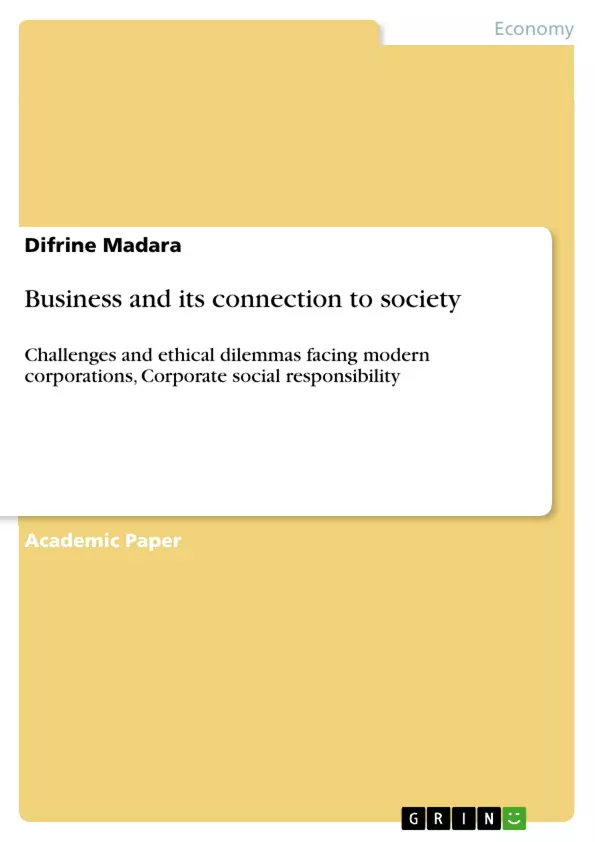The view that businesses exists for the good of the society has come under massive scrutiny in recent years. Argument that as long as businesses act legally and ethically they should not concern themselves with the larger social goals is now being challenged world over (Fernando, 2010). As a result, businesses have been forced to be more conscious of their environment and sustainability of their products and processes. Businesses must now look deep into the possible adverse impacts of their operations in the society and consumers. According to John Browne, to divert anger and suspicions that they have created, businesses must reconnect with the society radically (Grant and Miller, 2018). Looking at the case of many multinational corporations such as Nike, Inc, it is clear that there are numerous ethical and social responsibility concerns that businesses grapple that make them bad members of the society. In this regard, the author examines ethical and social responsibility concerns at Nike and other corporations with an aim of determining the best ways through which a business can connect with the society.
Table of Contents
- Business and its connection to society
- Introduction
- Analysis and discussion
- Challenges and ethical dilemmas facing modern corporations
- Corporate social responsibility
- Recommendations and suggestions
- Conclusion
Objectives and Key Themes
This text examines the relationship between business and society, particularly focusing on the ethical and social responsibility concerns facing modern corporations. It aims to analyze the challenges corporations encounter in balancing profit maximization with their social and environmental obligations. Through a case study of Nike, Inc., the text explores various ethical dilemmas and suggests ways for businesses to connect with society in a more responsible manner.
- The evolving role of businesses in society
- Ethical dilemmas and challenges facing corporations
- Corporate social responsibility and sustainability
- The importance of balancing economic needs with social values
- The impact of globalization on business ethics
Chapter Summaries
The first chapter introduces the topic of business and its connection to society. It discusses the growing scrutiny of businesses' social responsibilities and the increasing pressure for corporations to act ethically and sustainably. The chapter argues that businesses should aim to create value not just profits, prioritizing societal needs alongside economic ones.
The second chapter delves into the challenges and ethical dilemmas faced by modern corporations. It explores internal and external challenges, including resource management, employee retention, and navigating ethical complexities in decision-making. The chapter also examines the ethical considerations surrounding manufacturing, advertising, image management, and employee enrichment.
The third chapter, which focuses on corporate social responsibility, analyzes how corporations can address the ethical concerns raised in the previous chapter. It explores strategies for promoting ethical behavior, fostering transparency, and engaging in sustainable practices.
Keywords
The key focus areas of this text include corporate social responsibility, ethical dilemmas, globalization, sustainability, shared value strategy, business ethics, employee enrichment, manufacturing, and advertising.
Frequently Asked Questions
What is the core idea of Corporate Social Responsibility (CSR)?
CSR is the concept that businesses should not only focus on profit but also act ethically and take responsibility for their impact on society and the environment.
Why are modern businesses under increasing scrutiny regarding social goals?
Public awareness of environmental sustainability and human rights has grown. Consumers now expect companies to contribute positively to society rather than just following the letter of the law.
What ethical dilemmas did Nike, Inc. face in its history?
Nike has faced significant criticism over manufacturing practices, including labor conditions in overseas factories, as well as ethical concerns in advertising and image management.
What is "Shared Value Strategy"?
It is a management strategy in which companies create measurable economic value by identifying and addressing social problems that intersect with their business.
How can a business radically reconnect with society?
By moving beyond simple philanthropy and integrating societal needs into their core business model, ensuring transparency, and prioritizing long-term sustainability over short-term gains.
- Quote paper
- Difrine Madara (Author), 2019, Business and its connection to society, Munich, GRIN Verlag, https://www.grin.com/document/512920



